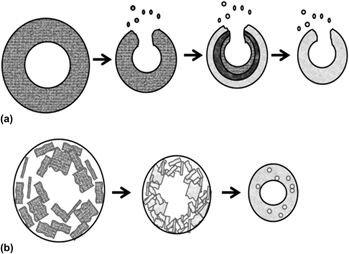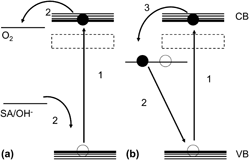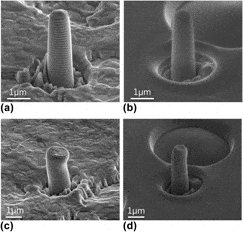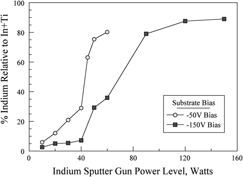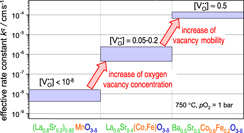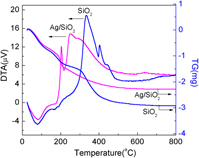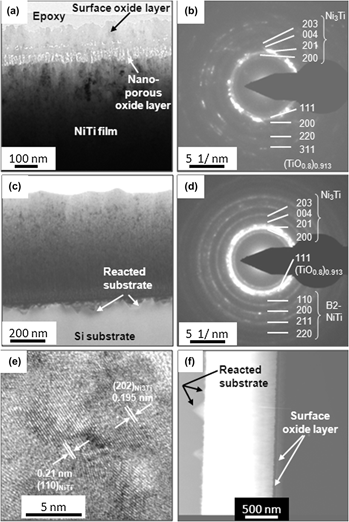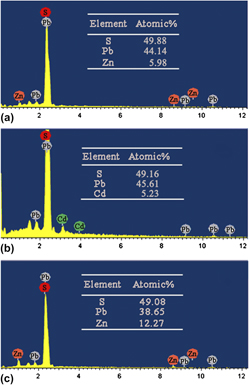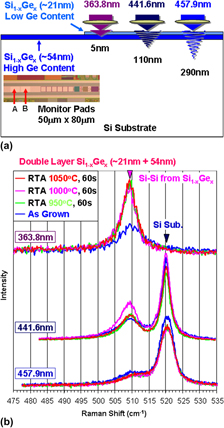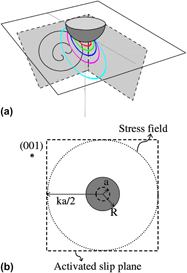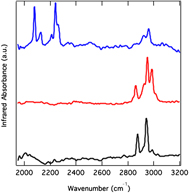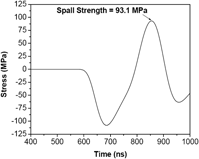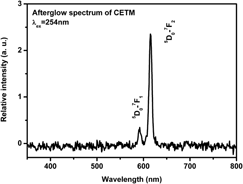Articles
Effect of humidity on tin whisker growth from Sn3Nd intermetallic compound
-
- Published online by Cambridge University Press:
- 13 April 2012, pp. 1652-1662
-
- Article
- Export citation
Particle generation by cosolvent spray pyrolysis: Effects of ethanol and ethylene glycol
-
- Published online by Cambridge University Press:
- 06 August 2012, pp. 2540-2550
-
- Article
- Export citation
Structural and optical properties of visible active photocatalytic WO3 thin films prepared by reactive dc magnetron sputtering
-
- Published online by Cambridge University Press:
- 05 December 2012, pp. 3130-3140
-
- Article
- Export citation
Experimental determination of the fracture toughness via microscratch tests: Application to polymers, ceramics, and metals
-
- Published online by Cambridge University Press:
- 03 January 2012, pp. 485-493
-
- Article
- Export citation
Effect of strain hardening on the elastic properties and normalized velocity of hybrid UHMWPE–nylon 6–SWCNT nanocomposites fiber
-
- Published online by Cambridge University Press:
- 24 May 2012, pp. 2657-2667
-
- Article
- Export citation
Microcompression study of Al-Nb nanoscale multilayers
-
- Published online by Cambridge University Press:
- 20 January 2012, pp. 592-598
-
- Article
- Export citation
Structural and tribological characterization of Ti–In–N films deposited by magnetron sputter deposition
-
- Published online by Cambridge University Press:
- 07 November 2011, pp. 850-856
-
- Article
- Export citation
Oxygen exchange kinetics on solid oxide fuel cell cathode materials—general trends and their mechanistic interpretation
-
- Published online by Cambridge University Press:
- 03 July 2012, pp. 2000-2008
-
- Article
- Export citation
Improved structural and electrical properties of thin ZnO:Al films by dc filtered cathodic arc deposition
-
- Published online by Cambridge University Press:
- 07 November 2011, pp. 857-862
-
- Article
- Export citation
Structure transition, formation, and optical absorption property study of Ag/SiO2 nanofilm by sol–gel method
-
- Published online by Cambridge University Press:
- 07 December 2012, pp. 3141-3146
-
- Article
- Export citation
Influence of annealing on oxidation, microstructure and mechanical properties of Ni-49Ti films
-
- Published online by Cambridge University Press:
- 27 March 2012, pp. 1068-1079
-
- Article
- Export citation
Surfactant-assisted reflux synthesis of PbS nanostructures and their properties
-
- Published online by Cambridge University Press:
- 29 October 2012, pp. 2916-2924
-
- Article
- Export citation
Micro-Raman characterization of Ge diffusion and Si stress change in thin epitaxial Si1−xGex layers on Si(100) after rapid thermal annealing
-
- Published online by Cambridge University Press:
- 03 April 2012, pp. 1314-1323
-
- Article
- Export citation
Dislocation mechanisms of radius effect on displacement bursts during spherical nanoindentations
-
- Published online by Cambridge University Press:
- 12 June 2012, pp. 2161-2166
-
- Article
- Export citation
Reactions and reversible hydrogenation of single-walled carbon nanotube anions
-
- Published online by Cambridge University Press:
- 28 September 2012, pp. 2806-2811
-
- Article
- Export citation
Dynamic tensile strength of polyurea
-
- Published online by Cambridge University Press:
- 13 December 2011, pp. 494-499
-
- Article
- Export citation
Largely enhanced thermoelectric properties of the binary-phased PbTe–Sb2Te3 nanocomposites
-
- Published online by Cambridge University Press:
- 19 January 2012, pp. 734-739
-
- Article
- Export citation
Back Cover (OBC, IBC) and matter
JMR volume 27 issue 10 Cover and Back matter
-
- Published online by Cambridge University Press:
- 30 April 2012, pp. b1-b4
-
- Article
-
- You have access
- Export citation
Articles
Enhancement on afterglow properties of Eu3+ by Ti4+, Mg2+ incorporation in CaWO4 matrix
-
- Published online by Cambridge University Press:
- 07 February 2012, pp. 959-964
-
- Article
- Export citation
Plasticity in the nanoscale Cu/Nb single-crystal multilayers as revealed by synchrotron Laue x-ray microdiffraction
-
- Published online by Cambridge University Press:
- 04 January 2012, pp. 599-611
-
- Article
- Export citation


